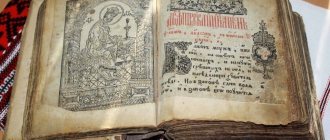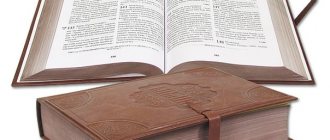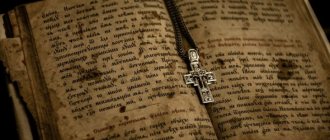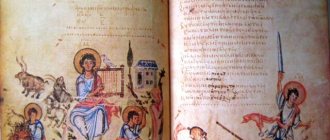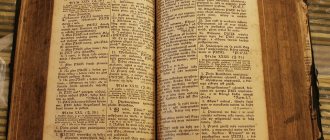The Lord has provided man with many different ways of communicating with him, including prayer. In it, believers usually ask God for help and protection, as well as consolation in difficult life moments. Psalm 5 is one of the most powerful psalms expressing such a request; it is indispensable for any Orthodox Christian who gives up in the face of accumulated problems.
This is the voice that you cannot do without when you cannot turn to God in your own words. This work, included in the Psalter, is a morning prayer in which King David reflects on the attitude of the Almighty towards the righteous and those who do not live according to the laws of God.
History of writing
To understand this issue, you need to carefully study all the details of the fifth psalm. It begins with “To the Chief of the Choir”; next to it there is also an inscription indicating to the accompaniment of which instruments the kathisma should be performed. It was sung, as you know, with wind instruments.
The word “mictam” also appears in the work, which is interpreted differently by different experts. Many assume that this means “covering,” that is, the psalm itself should be considered a “prayer of atonement.”
Like many other inspired texts, this one was written by David in difficult moments of his life. As we know, the king rarely felt at ease, since from a young age until old age he regularly faced attacks from enemies, persecution, and betrayal by those who were supposed to be his supporters.
Among the latter is the prophet’s heir, Absalal, who prepared an uprising against his father. This act hurt the son of David painfully; his heart was torn with anger and inability to come to terms with injustice.
In Psalm 5, the king turns to the Most High, promising him that he will always cry to heaven. At the same time, the author emphasizes:
- he is confident that his words will be heard by God;
- he acknowledges the glory and holiness of the Lord;
- he seeks the answer in worship.
David hopes that the Savior will protect him from enemy attacks and help the people of Israel.
The song of lament was composed just at the time when Absal was actively preparing an uprising against David. That is, the king worked on it even before his forced flight. This can be judged by carefully studying all the emotions that the author expressed in his work. He declares the lawlessness committed by his enemies, the spread of lies, flattering promises, which many blindly believe, agreeing to stage a violent coup that will not happen without bloodshed.
At the same time, David prays and asks God not only for punishment for those who have stepped on the “crooked path,” but also for correction of his own path. Each line in the kathisma indicates that it was written during the birth of the uprising under the leadership of Absalom. Already at the very beginning, the king, not yet leaving the temple, saw the connection between the beginning unrest among the people and his sin, and saw by what means his son was trying to get rid of it.
The fifth psalm is not just a petition, but a painful cry that David emits, realizing that he is in great danger.
PSALM 4 Canonical Russian translation
PSALM 4
1 To the director of the choir. On string instruments. Psalm of David.
2 When I cry, hear me, O God of my righteousness! In tight spaces, You gave me space. Have mercy on me and hear my prayer. 3 Sons of husbands! How long will my glory be in reproach? How long will you love vanity and seek lies? 4 Know that the Lord has set apart His holy one for Himself; The Lord hears when I call on Him. 5 When you are angry, do not sin: meditate in your hearts on your beds, and be calm; 6 Offer the sacrifices of righteousness and trust in the Lord. 7 Many say, “Who will show us good?” Show us the light of Your face, O Lord! 8 You have filled my heart with joy since the time their bread and wine increased. 9 I lie down calmly and sleep, for You, O Lord, alone allow me to live in safety.
Reading rules
It is recommended to read Psalm 5 every morning along with other morning prayers. It is not necessary to learn a piece by heart; not doing so will not be a bad thing. Many Orthodox Christians copy the text of this lamentation song onto a separate sheet of paper in order to be able to communicate through kathisma with God anywhere.
It must be used following the following prayer rules:
- Make sure first that nothing will distract you from turning to the Lord, and retire.
- Light a church candle if you have one at hand.
- Concentrate, read the words thoughtfully, take your time.
Important! Don't treat prayer like a spell. Read it regularly, trying to grasp the meaning of each line.
PSALM 3 Canonical Russian translation
1 Psalm of David, when he fled from Absalom his son.
2 Lord! how my enemies have multiplied! Many are rebelling against me; 3 Many say to my soul, “He has no salvation in God.” 4 But You, O Lord, are a shield before me, my glory, and You lift up my head. 5 With my voice I cry to the Lord, and He hears me from His holy mountain. 6 I lie down, sleep and get up, for the Lord protects me. 7 I will not be afraid of the people who have taken up arms against me on all sides. 8 Arise, Lord! save me, my God! for You strike all my enemies on the cheek; you break the teeth of the wicked. 9 Salvation is from the Lord. Upon Your people is Your blessing.
Text of prayer Psalm 5
In Church Slavonic
In churches, during services, the fifth kathisma is performed in Church Slavonic, but many believers find it difficult to read the work in this language. However, this can be learned, just take the text with the accents placed in it. Additionally, you may need the works of the Holy Fathers, which will allow you to interpret incomprehensible lines.
In Russian
On the Internet you will find more than one translation of Psalm 5 into Russian. Choose the one that is most convenient for you, the one that is easier to read and understand. In this form, among other things, it is easier to learn it by heart.
Interpretation
The correct translation of the Hebrew word הַנְּחִילֹ֗ות (in the inscription or verse 1) is unclear; then the NRSV and Luther's Bible are again like “for the flute.”
In the Septuagint, Vulgate and some Arabic translations נחל from "to inherit" means "per ea quae haereditatem conquitur" (Vulgate) and κληρονομος (Septuagint). Accordingly, this would be translated into English as “for the benefit of those who receive the inheritance.” Consequently, Augustine, Cassiodorus and others [3] interpreted it as “those heirs of God.”
A thoroughly Christological interpretation can be found in Martin Luther's work, which finds the third verse revealing that the humanization of man occurs through the incarnation of Jesus Christ.[4]
Gerhard Ebeling sees in the Psalm both a complaint (verse 10) and at the same time rejoicing and joy (verse 12).[5]
Interpretation of Psalm 5
To understand the meaning of the fifth kathisma, you need to carefully study all its verses:
- In verses 2 through 4, David pleads with God to hear him and solve his problem. At the same time, the king has no doubt that the Savior will answer his prayer, because he always pays attention to the words addressed to him, which come from his very heart. The author admires the fact that he, a simple person, a grain of sand in the endless desert, has the opportunity to communicate with the Creator, the one who rules on Earth and in Heaven. At such a moment, prayer unites him and the Almighty. This part of the work serves as a reminder to every Christian that a sincere request will be considered by the Lord, that his ear is always directed towards believers, who do not always expect understanding from others like them. This is a reminder that we must wait patiently and humbly for God’s answer, because the Savior needs time to think. Following the example of David, the Orthodox must not lose faith that the Creator hears his cry and cry, heard in a moment of sorrow. This thought alone brings comfort. Starting the day with the fifth psalm, a person need not worry that the Lord will not take control of his problems.
- The main idea of verses 5-7 is God's attitude towards sin. Everything here would seem to be obvious, because the Almighty does not tolerate sin. Emphasizing this, David prays for protection and help. He understands that the Creator’s heart is big, filled with pure holiness and love, but at the same time He is always ready to judge the sinner. The king believes that justice will prevail and everyone who commits lawlessness will be punished. The author promises God to live in worship until his death. It is important to emphasize that in this part of the kathisma, David asks the Lord for guidance for the sake of his ill-wishers. This is a reminder to believers that, succumbing to anger and the desire for revenge, a person can, without knowing it, fall into sin. When praying, you need to ask for forgiveness not only for yourself, but also for your enemies, thus surrendering yourself to the guidance of the Almighty.
Psalm 5 makes people think about how to behave in difficult times in life. There is only one true option - to trust God, because by His will the situation can change. Changes will only be witnessed by those who repent and pray. Any unrepentant wickedness leads a Christian to hell.
David is confident that his enemies, having rebelled against him, also rebelled against the Lord, which means they will definitely face punishment. At the same time, the king does not strive for revenge, but for justice, which would be the answer to his prayer.
The fifth kathisma is addressed not only to those who suffer from the evil deeds of ill-wishers, but also to those who are tempted by temporary blessings, violating God's laws, doubting His providence. Following the example of David, Christians need to care not about eternal blessings, but about the well-being that is reserved only for the righteous. You should remind yourself of how you should act in life regularly; therefore, you should read Psalm 5 often. You should also listen to it in your free time .
PSALMS. PSALM 1-10
PSALM 1
Listen to the Psalms Psalm 1 online
Psalm of David.
1 Blessed is the man who does not walk in the counsel of the wicked, nor stand in the way of sinners, nor sit in the seat of the wicked,
2 But his will is in the law of the Lord, and in His law he meditates day and night!
3 And he will be like a tree planted by streams of water, which brings forth its fruit in its season, and whose leaf does not wither; and in everything he does, he will succeed.
4 Not so are the wicked, [not so]: but they are like dust swept away by the wind [from the face of the earth].
5 Therefore the wicked will not stand in judgment, nor sinners in the assembly of the righteous.
6 For the Lord knows the way of the righteous, but the way of the wicked will perish.
King David. Artist Marc Chagall
PSALM 2
Listen to the Psalms Psalm 2 online
Psalm of David.
1 Why do nations rage, and nations plot vain things?
2 The kings of the earth rise up, and the rulers take counsel together against the Lord and against His Anointed.
3 “Let us break their bonds, and cast away their fetters from us.”
4 He who dwells in heaven will laugh; the Lord will mock him.
5 Then He will say to them in His anger and dismay them with His fury:
6 “I have anointed My King over Zion, My holy mountain;
7 I will declare the decree: The Lord said to Me: You are My Son; Today I have given birth to You;
8 Ask of Me, and I will give the nations for Your inheritance, and the ends of the earth for Your possession;
9 You will strike them with a rod of iron; You will break them in pieces like a potter’s vessel.”
10 Therefore, understand, O kings; learn, judges of the earth!
11 Serve the Lord with fear and rejoice [before Him] with trembling.
12 Honor the Son, lest He be angry, and lest you perish in your journey, for His anger will soon kindle. Blessed are all who trust in Him.
PSALM 3
Listen to the Psalms Psalm 3 online
1 Psalm of David, when he fled from Absalom his son.
2 Lord! how my enemies have multiplied! Many are rebelling against me
3 Many say to my soul, “He has no salvation in God.”
4 But You, O Lord, are a shield before me, my glory, and You lift up my head.
5 With my voice I cry to the Lord, and He hears me from His holy mountain.
6 I lie down, sleep and get up, for the Lord protects me.
7 I will not be afraid of the people who have taken up arms against me on all sides.
8 Arise, Lord! save me, my God! for You strike all my enemies on the cheek; you break the teeth of the wicked.
9 Salvation is from the Lord. Upon Your people is Your blessing.
PSALM 4
Listen to the PSALMTER Psalm 4 online
1 To the director of the choir. On string instruments. Psalm of David.
2 When I cry, hear me, O God of my righteousness! In tight spaces, You gave me space. Have mercy on me and hear my prayer.
3 Sons of husbands! How long will my glory be in reproach? How long will you love vanity and seek lies?
4 Know that the Lord has set apart His holy one for Himself; The Lord hears when I call on Him.
5 When you are angry, do not sin: meditate in your hearts on your beds, and be calm;
6 Offer the sacrifices of righteousness and trust in the Lord.
7 Many say, “Who will show us good?” Show us the light of Your face, O Lord!
8 Thou hast filled my heart with gladness from the time that their bread and wine and oil abounded.
9 I lie down calmly and sleep, for You, O Lord, alone allow me to live in safety.
PSALM 5
Listen to the Psalms Psalm 5 online
1 To the director of the choir. On wind instruments. Psalm of David.
2 Hear, O Lord, my words, understand my thoughts.
3 Hear the voice of my cry, my King and my God! for I pray to You.
4 Lord! early hear my voice, early I will appear before You and wait,
5 For You are a God who does not love iniquity; The evil one will not dwell with You;
6 The wicked will not abide in Your sight: You hate all the workers of iniquity.
7 You will destroy those who speak lies; The Lord abhors the bloodthirsty and treacherous.
8 And I, according to the abundance of Your mercy, will enter Your house, I will worship Your holy temple in Your fear.
9 Lord! guide me in Your righteousness, for the sake of my enemies; level your path before me.
10 For there is no truth in their mouth: their heart is destruction, their throat is an open grave, they flatter with their tongue.
11 Condemn them, O God, that they may fall by their own devices; Because of the multitude of their wickedness, cast them away, for they have rebelled against You.
12 And all those who trust in You will rejoice, they will rejoice forever, and You will protect them; and those who love Your name will boast in You.
13 For you bless the righteous, O Lord; You crown him with favor like a shield.
PSALM 6
Listen to the PSALMS Psalm 6 online
1 To the director of the choir. On eight string. Psalm of David.
2 Lord! Do not rebuke me in Your wrath, and do not punish me in Your anger.
3 Have mercy on me, O Lord, for I am weak; Heal me, O Lord, for my bones are shaken;
4 And my soul is greatly troubled; How long are you, Lord?
5 Turn, O Lord, deliver my soul, save me for the sake of Thy mercy,
6 For in death there is no remembrance of You: in the grave who will praise You?
7 I am weary with my groanings: I wash my bed every night, I wet my bed with my tears.
8 My eye is withered through sorrow, it is worn out because of all my enemies.
9 Depart from me, all you workers of iniquity, for the Lord has heard the voice of my crying,
10 The Lord has heard my prayer; The Lord will accept my prayer.
11 Let all my enemies be put to shame and sorely defeated; may they return and be ashamed instantly.
PSALM 7
Listen to the PSALMTER Psalm 7 online
1 The song of lamentation that David sang to the Lord in the cause of Hus, of the tribe of Benjamin.
2 Lord, my God! in You I trust; save me from all my persecutors and deliver me;
3 Let him not, like a lion, tear out my soul, tormenting me when there is no one to deliver [and save].
4 Lord, my God! if I have done anything, if there is injustice in my hands,
5 if I repaid with evil the one who was with me in the world - I, who saved even the one who without reason became my enemy -
6 Then let the enemy pursue my soul and overtake me, let him trample my life into the ground, and cast my glory into dust.
7 Arise, O Lord, in Thy wrath; move against the fury of my enemies, awaken for me to the judgment that You commanded, -
8 A crowd of people will stand around You; rise above it to a height.
9 The Lord judges the nations. Judge me, O Lord, according to my righteousness and according to my integrity within me.
10 Let the wickedness of the wicked cease, and strengthen the righteous, for You test the hearts and bellies, O righteous God!
11 My shield is in God, who saves the upright in heart.
12 God is a righteous judge, [mighty and long-suffering,] and a God who is strict every day,
13 if anyone does not apply. He sharpens His sword, He bends His bow and guides it,
14 He prepares for him vessels of death, He makes His arrows burning.
15 Behold, the wicked conceived iniquity, was pregnant with malice, and gave birth to lies;
16 He dug a ditch, and dug it out, and fell into the pit that he had prepared:
17 His wickedness will turn on his head, and his wickedness will fall on his crown.
18 I will praise the Lord according to His righteousness and sing praise to the name of the Lord Most High.
PSALM 8
Listen to the PSALMTER Psalm 8 online
1 To the director of the choir. On the gun of Gath. Psalm of David.
2 Lord our God! how majestic is Your name throughout the whole earth! Your glory extends above the heavens!
3 From the mouths of babes and sucklings Thou hast made praise for the sake of Thy enemies, in order to silence the enemy and the avenger.
4 When I look at Your heavens, the work of Your fingers, at the moon and the stars that You have set,
5 What is man, that You are mindful of him, and the son of man, that You visit him?
6 Thou hast made him little less than the angels: thou hast crowned him with glory and honor;
7 You have made him ruler over the works of your hands; He laid everything under his feet:
8 sheep and all oxen, and also the beasts of the field,
9 birds of the air and fish of the sea, everything that passes on the paths of the sea.
10 Lord our God! How majestic is Your name throughout the whole earth!
PSALM 9
Listen to the Psalms Psalm 9 online
1 To the director of the choir. After the death of Laben. Psalm of David.
2 I will praise [You], Lord, with all my heart, and proclaim all Your wonders.
3 I will rejoice and rejoice in You, I will sing to Your name, O Most High.
4 When my enemies are turned back, they will stumble and perish before You,
5 For You have executed my judgment and my litigation; You have sat on the throne, righteous Judge.
6 You were angry with the nations, you destroyed the wicked, you blotted out their name forever and ever.
7 The enemy has no weapons at all, and you have destroyed cities; their memory perished with them.
8 But the Lord abides forever; He has prepared His throne for judgment,
9 And He will judge the world with righteousness, He will execute judgment on the nations with righteousness.
10 And the Lord will be a refuge for the oppressed, a refuge in times of trouble;
11 And those who know Your name will trust in You, because You do not forsake those who seek You, O Lord.
12 Sing to the Lord who dwells in Zion; proclaim His works among the nations,
13 For He exacts blood; remembers them, does not forget the cry of the oppressed.
14 Have mercy on me, O Lord; look at my suffering from those who hate me - You who lift me up from the gates of death,
15 That I may proclaim all Thy praises in the gates of the daughter of Zion: I will rejoice in Thy salvation.
16 The nations fell into the pit that they had dug; in the net which they hid their foot was entangled.
17 The Lord was known by the judgment which He executed; the wicked is caught in the works of his own hands.
18 Let the wicked turn to hell, all the nations that forget God.
19 For the poor will not be forever forgotten, and the hope of the poor will not be completely lost.
20 Arise, O Lord, let not man prevail, and let the nations be judged before Thy presence.
21 O Lord, bring fear upon them; let the nations know that they are human.
22 Why, O Lord, do you stand afar off, hiding yourself in times of trouble?
23 In his pride the wicked persecute the poor: let them be caught in the tricks which they themselves devise.
24 For the wicked boasts in the lust of his soul; the self-interested man pleases himself.
25 In his arrogance the wicked despises the Lord: “he will not seek”; in all his thoughts: “There is no God!”
26 His ways are always destructive; Your judgments are far from him; he looks at all his enemies with disdain;
27 He says in his heart: “I will not be moved; no evil will befall me throughout generation and generation”;
28 His mouth is full of curses, deceit and lies; under the tongue is its torment and destruction;
29 He sits in ambush outside the courtyard, killing the innocent in secret places; his eyes spy on the poor;
30 He lies in wait in a secret place, like a lion in his den; lies in wait to capture the poor; he grabs the poor man, dragging him into his net;
31 He bends, he bends down, and the poor fall into his strong claws;
32 He says in his heart: God has forgotten, He has hidden His face, He will never see.
33 Arise, O Lord my God, lift up Your hand, do not forget the oppressed [Thine to the end].
34 Why does the wicked despise God, saying in his heart, “You will not require it”?
35 You see, for You look upon insults and oppression, to repay with Your hand. The poor man betrays himself to you; to the orphan you are a helper.
36 Break the arm of the wicked and the evil one, so that his wickedness may be sought and not found.
37 The Lord is king forever and ever; The pagans will disappear from His land.
38 Lord! You hear the desires of the humble; strengthen their heart; open your ear,
39 to give justice to the fatherless and the oppressed, so that man may not be a terror on earth any more.
PSALM 10
Listen to PSALTH Psalm 10 online
To the head of the choir. Psalm of David.
1 I trust in the Lord; How then do you say to my soul: “Fly away to your mountain like a bird”?
2 For behold, the wicked have drawn the bow, and have set their arrow to the string, to shoot in the darkness at the upright in heart.
3 When the foundations are destroyed, what will the righteous do?
4 The Lord is in His holy temple, the Lord is His throne in heaven, His eyes look [on the poor]; His eyelids try the sons of men.
5 The Lord tests the righteous, but His soul hates the wicked and the violent.
6 He will rain burning coals, fire and brimstone on the wicked; and the scorching wind is their portion from the cup;
7 For the Lord is righteous, loving righteousness; He sees the righteous in His face.
References
- David dictating the psalms, codex binding in Treasure of Saint-Denis, (Louvre France), late 10th century–11th century.
- The Artscroll Tehillim page 6
- Augustine: Enarrationes in Psalmos (vollständige englische Übersetzung), Cassiodorus: Expositio in Psalterium.
- Luther, M., Weimarer Osgabe (Luther) 5.128f.
- Gerhard Ebeling: Psalmenmeditation, (1968) p65.
- https://www.biblegateway.com/quicksearch/?search=name+&version=ESV&searchtype=all&spanbegin=23&spanend=23&resultspp=500
- O Palmer Robertson, The Flow of the Psalms: Discovering Their Structure and Theology. Phillipsburg, NJ: P&R Publishing, 2015.
- James C. Bruckner, Healthy Human Life: The Biblical Evidence, 2012.
- John Bergsma and Brant Pitre, A Catholic Introduction to the Old Testament, Ignatius Press
- https://www.crivoice.org/psalmtypes.html
- Complete Artscroll Siddur p.12
- Kirkpatrick, A. F. (1901). The Book of Psalms: With Introduction and Notes
. Cambridge Bible for Schools and Colleges. Book IV and V: Psalms XC-CL. Cambridge: University Press. item 838. Received February 28, 2019. - Translation denomination by Prosper Guéranger, (Abbaye Saint-Pierre de Solesmes, réimpression, 2007) p. 41.
- Psautier latin-français du bréviaire monastique, (1938/2003) p. 178.
- The main cycle of liturgical prayer lasts four weeks.
- Church of England, Book of Common Prayer: The Psalter as printed by John Baskerville in 1762, p. 196ff

